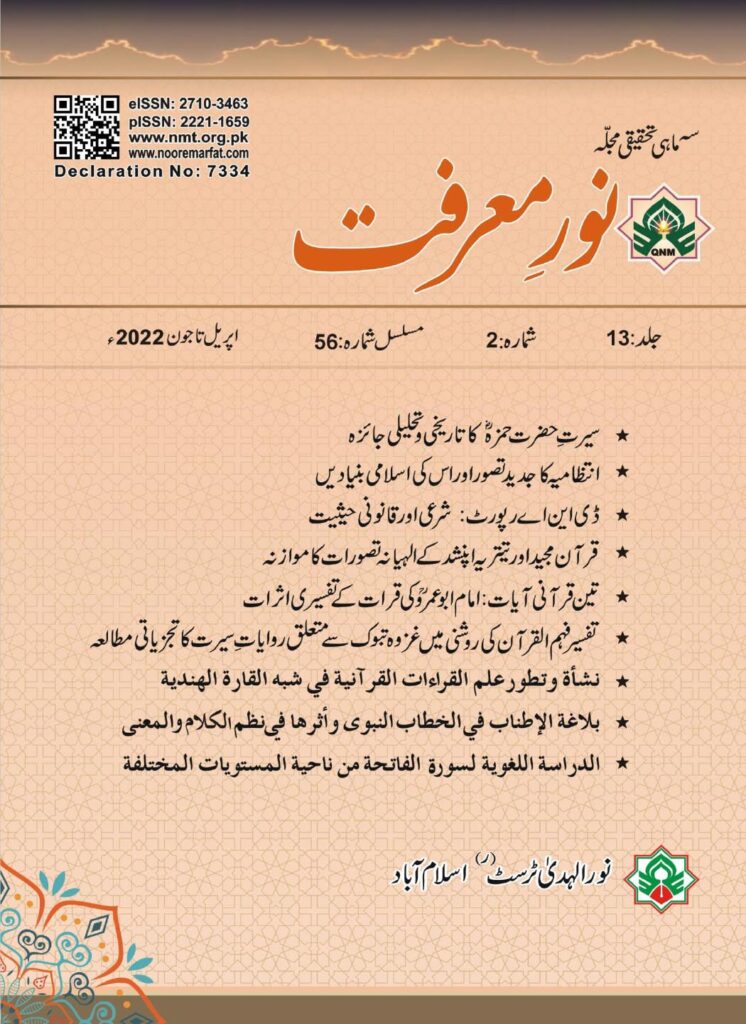Rahmatullah
BZU Multan
Keywords:
القرآن, سورۃ الفاتحہ, علم الصوتیات, علم الصرف, علم النحو
Abstract
Searching in the Book of Allah is one of the greatest endeavors of human thought, as the linguistic researcher finds in it a special goal. The Qur’an is a linguistic source and a fertile tributary for phonetic, morphological and semantic studies, and if it were not for linguistic studies, linguistic studies would not have reached what they have reached. Muslims have taken care of his diaphragm and his writing in word and meaning.
The Linguistics is an important role for understanding the Qur’an and its secrets and symbols. This is concerned with linguistic studies in a scientific manner, in which he studies the structure of the language, how to structure its vocabulary, the formation of words in it, the knowledge of sounds specific to each word and the nature of its pronunciation. This science is distributed in the following four fields:
- Phonetics 2. Marphamatics 3. Syntax 4. Semantics.
This research aims to understand the Qur’anic formulas and what is presented to their performance in the light of semantics, morphology, grammar, and phonology. And to show the extent of the relationship of the Qur’anic formulas with the ancient Arabic dialects.
The research relies on a scientific method as close as possible to the descriptive-analytical method, such as studying the linguistic phenomena in the Qur’anic texts, with reference to the opinions of the ancients and modernists in them. It also includes the study of Surat Al-Fatihah in terms of different linguistic levels.
References
Muhammad bin Abdullah bin Hamdawiyyah, al-Hakim, Abu Abduallh, Al-Mustadrik lil Hakim, (Bairut, Dar Almaerifit, nd.), Hadith #: 3295.
محمدبن عبدالله بن محمدبن حمدويہ، الحاكم، ابوعبدالله، المستدرک للحاکم، (بیروت، دار المعرفۃ، بدون تاريخ الطبع)، رقم الحدیث: 3295۔
Abdulwahid Alwafi, Eilm Allughat (Al-Qahirah, Nahzah Egypt liltibaeit Walnashr Waltuwzye, 1430 AH), 77.
عبدالواحد، الوافي، علم اللغۃ (القاھرۃ، نھضۃ مصر للطباعۃ والنشر والتوزیع 1430ھ)، 77۔
Abdul Rahman bn Ishaq, Abu Al-qasim, Aljamal Alzujaj (nc., Muassah Al-rasalah, nd.), 660.
عبدالرحمان بن اسحاق، ابو القاسم، الجمل الزجاجی (بدون اسم المصر، مؤسۃ الرسالۃ، سیریل نمبر20، بدون تاريخ الطبع)، 660۔
Ahmad Mukhtar, Mujam Allughah Alarabiyah Almuaasirah, Vol. 1 (Al-Qahirah, Alam Alkutab, 2001), 764.
احمد، مختار، معجم اللغۃ العربیۃ المعاصرۃ(القاھرۃ، عالم الکتب، 2001)، 764۔
Mehmood, Sieran, Eilm Allughah Muqaddamah Lilqari Alarabi, (Bairut, Dar Alnahzah Alarabiah, 1962), 11.
محمود، سعران، علم اللغۃ مقدمۃ للقاری العربی، سیریل نمبر 39 (بیروت، دار النھضۃ العربیۃ، 1962)، 11۔
Abdalrazzaq bin Faraaj, Alsaaeidy, Usool Ealm Alarabiyah Fi-almadinah, (Madinah Almunwarah, Majallah Aljamia Al’islamyah bil 1987), 321.
عبد الرزاق بن فراج، الصاعدی، اصو ل علم العربیۃ فی المدینۃ، ( المدینۃ المنورۃ، مجلۃ الجامعۃ الإسلامیۃ 1987)،321۔
Muhammad bin Umer, Fakhruddin, Abu Abdullah, Altafseer Al kabeer, Vol. 1 (Multan, Dar al Hadees, nd.), 102.
محمد بن عمر، فخرالدین، أبو عبداللہ، الفخر الرازی، التفسیر الکبیر، ج1(ملتان، دار الحدیث، بدون تاريخ الطبع)، 102۔
Muhammad bin Ahmad al Anansari, Abu Abdullah, al Qurtubi, Al Jaame Li Ahkam Al Quran Lilqurtabi, Vol. 1 (Quetta, Maktabah Rasheedia Eircular Road, nd.), 178.
محمد بن احمد الانصاری، أبو عبداللہ، القرطبی، الجامع لأحکام القرآن المعروف تفسیر القرطبی، تحقیق عبدالرزاق المھدي، ج1(کوئتہ، مکتبۃ رشیدیہ مرکی شارع، بدون تاريخ الطبع)،178۔
Abu Zakariya Yahya bin Zaid bin Abdullah bin Manzoor Aldalmi, Maani Alquran, Vol. 1 (Bairut, Darul Kutab Alilmiah, nd.), 1.
ابو زکریا یحي بن زیاد، الفراء، معانی القرآن، ج1 (بیروت، دارالکتب العلمیۃ، بدون تاريخ الطبع) ، 1۔
Wahbah, al Zuhali, Altafseer Almuneer, Vo. 1 (Bairut, Dar Alfikr Al Muaasir, 2003), 55-56.
وھبۃ، الزحیلی، التفسیر المنیر، ج1 (بیروت، دار الفکر المعاصر، 2003)، 55-56۔
Muhammad Ali, Al-Sabuni, Safwah Altafseer, Vol. 1 (Bairut, Dar Al Quran, 1980), 25.
محمد علی، الصابونی، صفوۃ التفاسیر، ج1 (بیروت، دارالقرآن الکریم،1980)، 25۔
